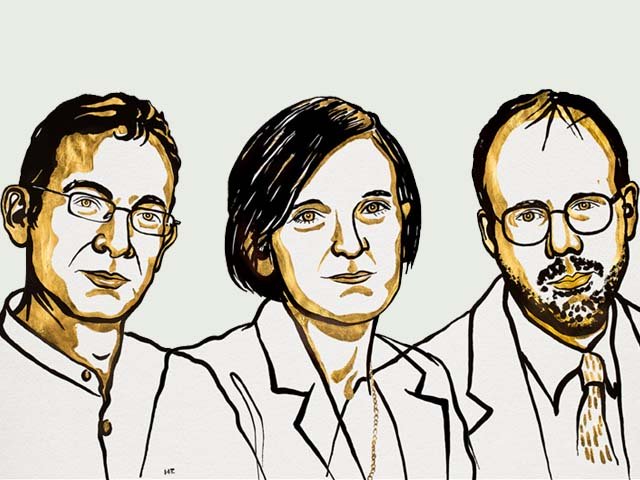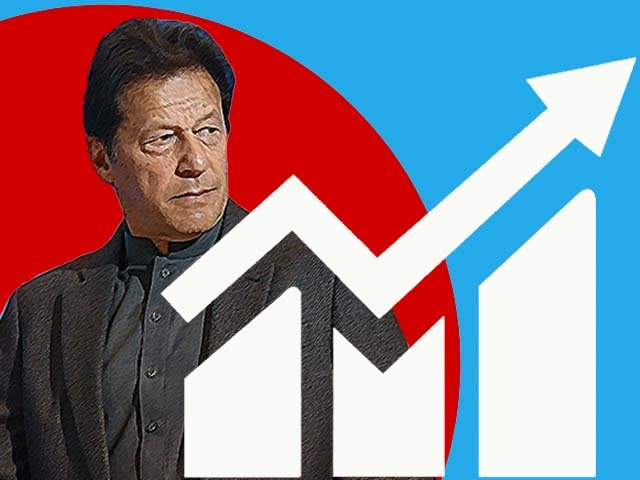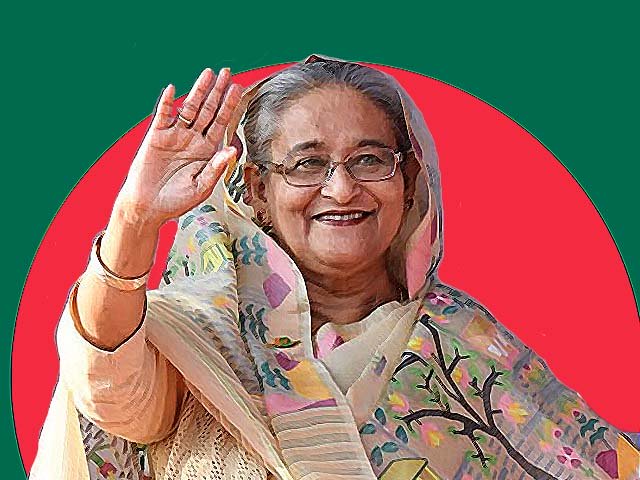
policy questions need to be broken into smaller units and then each unit should be studied to see what works and what doesn’t. PHOTO: TWITTER/ THE NOBEL PRIZE
What can Pakistan learn from this year’s Economics Nobel Prize winners?
Banerjee, Duflo and Kremer have replaced guess work and intuition in policy making with data and evidence
Abhijit Banerjee and Esther Duflo of Massachusetts Institute of Technology (MIT) and Michael Kremer of Harvard University won this year’s Nobel Prize in Economics. Congratulations to all three Nobel laureates. In their ground-breaking research, the three transformed the way developmental issues are studied, showing what works and what doesn’t.
Their adoption of the experimental approach and particularly the use of random control trials, used mostly by biologists, in developmental economics is considered ground-breaking. Experiments open the door to understanding and knowledge, and rather than assuming what would work or wouldn’t, their approach looked at experimental data to come to a decision. The scientific method randomly assigned subjects to control and experimental groups and then looked at the result to see if interventions or manipulations worked. That is, whether the differences in results of the two groups were statistically significant. The Royal Swedish Academy of Sciences highlights the significance of their approach by noting that the three received the award “for their experimental approach to alleviating poverty.”
Controlled experiments are not common to developmental economics research, as they are both costly and difficult to implement. That is why what the trio has done over a period of two decades is deserving of accolades. Their approach breaks big policy questions into manageable parts and then studies each part individually to see how the variables are related, which then leads to inferences about what worked and what didn’t; which is why the experiment-based approach the trio popularised has policy implications for countries struggling to alleviate poverty. This is precisely what makes their research increasingly relevant for policymakers in Pakistan.
The statistics regarding poverty in Pakistan and other low-income countries are staggering. Underlying these statistics, however, are the shattered dreams, hopes and aspirations of many people. The poor are malnourished and lack access to adequate health care, which means that diseases run their course and end in either debilitating or terminating lives. Children, young and vulnerable, rather than being in schools, end up working in exploitative, inhumane surroundings to support their families. The infant mortality rate is high and life span is low, while the visible signs of poverty, depressing and heart breaking, jolt the senses. Unfortunately, Pakistan and other low-income countries still have a long way to go to break the choke hold of poverty. Policy decisions in these countries suffer from many constraints, lacking rigour and the support of evidence while relying mostly on political expediency and self-aggrandisement.
This is precisely why the work of Banerjee, Duflo and Kremer is so important as they have replaced guess work and intuition in policy making with data and evidence. Developing countries can benefit from their experimental, evidence-based approach. The road map they have presented can help Pakistan and other low-income countries alleviate poverty, increase literacy, improve health, and reduce corruption. So what does their map show? First, poverty alleviation policies will yield results when they are based on data and evidence, not conjecture and convictions. If, for example, the goal is to increase school attendance, what would work, giving free books to children or treating their intestinal worms?
Banerjee noted that they “bring the message of policy based on evidence and hard thinking;” and Duflo added that policies should not be based on “intuition.” Thus, given that their research is grounded in data, it gives policymakers a window into the possible impact their real world implementation would have. Second, policy questions need to be broken into smaller units and then each unit should be studied to see what works and what doesn’t. Third, people affected by the problem need to get involved in the solution. If, for example, increasing vaccinations is the goal, should the village elders be consulted first for their buy-in or should clinics be set up with the hope that parents will bring their children to get vaccinated? Kremer suggested that a whole range of new insights will emerge by directly engaging with farmers, teachers, school children, non-profit organisations and with the governments in developing countries. Therefore, essentially, before developing policies, it is important to get to know people, the influencers, the followers, and the skeptics.
Poverty alleviation is a win-win solution. Given a conducive environment, the poor can enrich their lives in the here and now and not in some imaginary future while also contributing to the development of the country. On their own, they lack the wherewithal. Those who can make a difference – politicians, religious clerics, bureaucrats, business people, and military officials – can pull together and follow the map that shows how to traverse the difficult terrain to reach the noble goal of alleviating poverty.




COMMENTS
Comments are moderated and generally will be posted if they are on-topic and not abusive.
For more information, please see our Comments FAQ